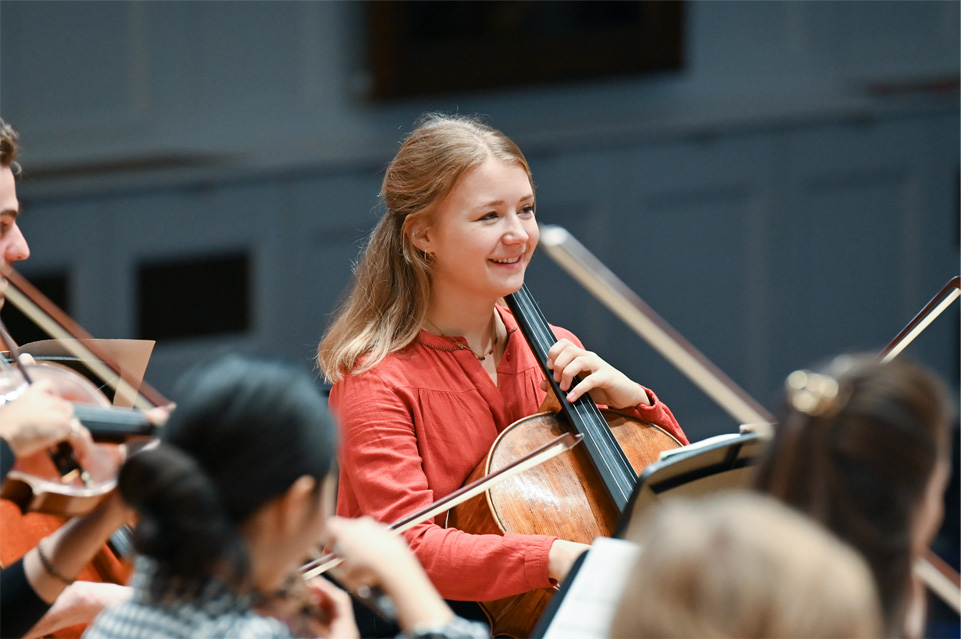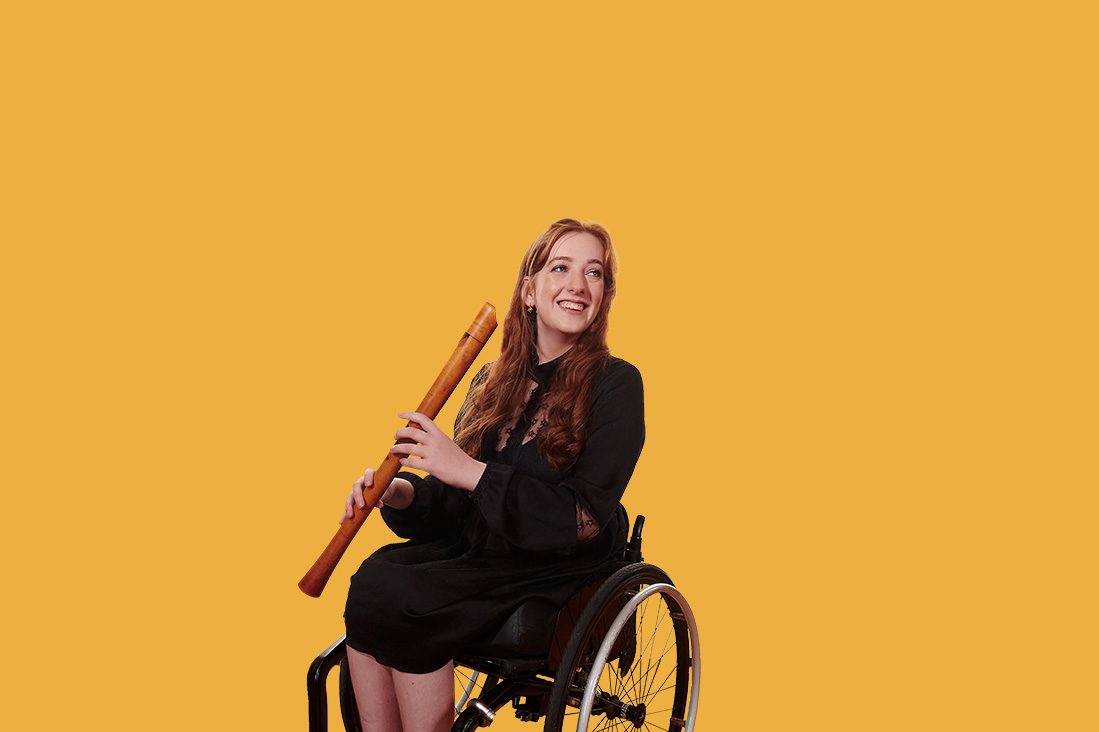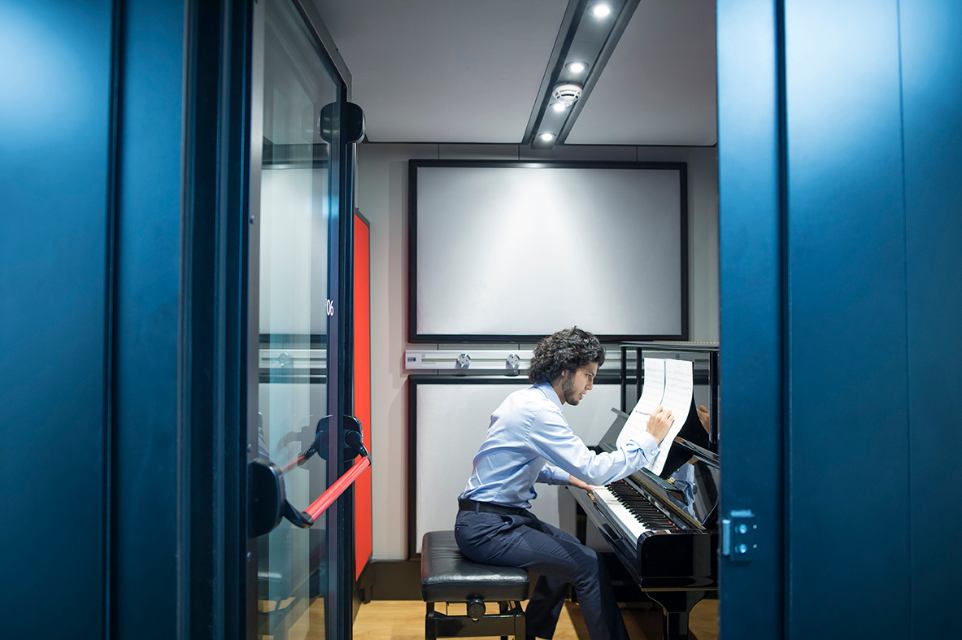BMus Refresh

The Bachelor of Music (BMus) programme at the Royal College of Music is driven by our passion for music and our unique knowledge of the industry.
Undergraduate study at the Royal College of Music balances high-level training in solo, chamber and ensemble performance with critical enquiry into music past and present. Students investigate music in context and how it operates in contemporary cultures. The RCM also provides a range of options for developing practical, theoretical, and applied skills.
The nature of your undergraduate experience at the RCM depends on your principal study specialism. In essence, it includes individual lessons with distinguished musicians; core units in historical, technical, practical, and vocational subjects delivered in small groups; and a variety of performances.
Learning & teaching
Our undergraduate programme is designed to be flexible, especially in years 3 and 4, ensuring you can undertake study directly relevant to your needs and aspirations. A variety of options helps every student develop their interests during their time at the RCM.
The RCM and other conservatoires from around the world launched the Global Conservatoire in May 2021, allowing students to learn from a global classroom and develop their international networks. Students are able to choose Global Conservatoire modules as part of their programme of study.
One-to-one lessons are at the very heart of every RCM student’s learning experience. The RCM’s impressive list of professors includes renowned instrumental and vocal soloists, distinguished repertoire and operatic coaches, prominent composers and conductors, plus principal players in major London orchestras such as the as the London Symphony Orchestra, Philharmonia Orchestra, London Philharmonic Orchestra, BBC Symphony Orchestra and Royal Opera House Orchestra. Our world-class professors offer students not only first-rate teaching, but also mentorship and networking opportunities.
All principal studies are delivered through a combination of one-to-one tuition complemented by performance classes, workshops, masterclasses, lessons from visiting professors, ensemble activities, seminars and lecture series as appropriate.
The majority of students focus on a single principal study instrument or specialism. Single study students may want to pursue additional related or second study tuition alongside their principal specialism, but this is not a requirement.
Single study: principal & related study
Related study allows instrumentalists to receive tuition on an instrument closely related to their principal study, such as oboe and cor anglais, flute and piccolo or piano and harpsichord..
Related studies are approved by the relevant Head of Faculty once a student has started their course. No audition is required and you do not need to let us know about your interest in related study before you arrive at the RCM.
Single study: principal & second study
Second study allows students to receive tuition in a second specialism, taught and assessed at a lower intensity than their principal study, in an area that does not qualify for related study. Examples include piano and violin, or trumpet and composition.
You will apply and be auditioned for your principal study specialism only. If your application is successful you will be eligible to audition for second study when you start your programme at the RCM.
Joint principal study
Students with an equally high level of ability in two areas may undertake joint principal study, in which their two specialisms are taught and assessed with equal weight. This is a demanding option, requiring a very high level of practical skill.
Due to the large number of scheduled vocal classes it is not possible for singers or percussionists to undertake Joint Principal Study.
If you wish to undertake joint principal study you should submit only one application and select joint principal study on your application form. You will be auditioned for and may be offered a place to study two specialisms at equal intensity. Depending on your performance at audition, the RCM may decide to offer a place on only one of the two principal studies.
You will be taught by a team of world-class professors, many of whom hold principal positions in major ensembles and some of whom are the biggest names in their field. Contextual studies are taught by a range of academics, including those undertaking active research, who are regarded as experts in their disciplines. You may also be taught by external specialists and have the chance to learn with visiting artists.
Opportunities
From the very beginning of the course you will be able to draw on exceptional resources and opportunities, such as the RCM Library, the RCM Museum, the Centre for Performance Science, Creative Careers Centre and RCM Sparks – our outreach and education programme.
Course reviews
RCM courses are reviewed annually in response to student and external examiner feedback, which sometimes results in minor changes, such as the availability of particular modules. A more thorough review is undertaken every five to six years, after which more substantial changes may be made while maintaining the ethos that underpins the course. Our review process is part of the RCM’s continued commitment to provide the best possible education and music training. The information provided here reflects the official course outline as it currently stands. In the event of alterations following a review, we will update this page as soon as possible.
The BMus curriculum was last reviewed in Spring 2020.
Entry requirements
All offers for performers are made on the basis of their performance at audition.
All offers for composers are made on the basis of their portfolio and interview.
Please see the list of international qualifications below for details of qualifications that are commonly accepted by the RCM as equivalent to our UK entry requirements. This list is not exhaustive and other qualifications will be considered.
The RCM is happy to consider applicants for entry into Year 2 or 3 of the BMus programme where equivalent prior study has been completed. Entry for performers is subject to audition; composers need to submit a portfolio and may be invited for interview. Students wishing to transfer should apply via UCAS Conservatoires, stating the year of study you wish to be considered for. You will need to provide full transcripts from your current university or conservatoire to demonstrate that you have successfully completed studies equivalent to the first year(s) of the BMus programme.
The RCM is also willing to facilitate transfer from the RCM to other institutions.
To discuss transfer options please contact our Admissions team.
The RCM welcomes applicants from all backgrounds and alternative qualifications may be considered. If your qualifications are not listed here, please contact our Admissions team, who will be happy to discuss your suitability for the programme.
English language requirements
All applicants must be able to demonstrate that their level of English language ability meets the Royal College of Music’s minimum requirements in order for their application to be accepted.
If you require a visa to study at the RCM, you must meet the English language requirements before the RCM is permitted to sponsor your visa application.
How to apply
The application deadline has now passed for this course and we are unable to consider any further late applications. Applications for September 2025 entry will open in July. Please contact our friendly Admissions team if you need any advice on applying.
Please note that there is a later deadline for some overseas auditions. Information on audition locations can be found here.
All applicants (including international applicants) should apply online through the UCAS Conservatoires admissions service, where you can apply simultaneously to all the institutions that are members of Conservatoires UK. You can track your application, find out when your audition is, and get the results of your audition all on UCAS Conservatoires. You can also confirm your decisions online.
Applicants interested in joint principal study are reminded to submit only one application. If you submit two applications you will be charged twice.
Guidance on completing your application form is available on the UCAS Conservatoires website. As part of your application, you will require two references: one practical reference (normally from your current music teacher) and one academic reference (normally from someone at your current/previous educational institution who can comment on your academic ability). You must enter your referees’ details into the application and an automated e-mail will be sent to them requesting a reference. Only once your referees have responded will your application be forwarded to the RCM, so it is important to begin your application in good time.
If your referee is unable to provide a reference in time, they should send their reference directly to admissionsreferences@rcm.ac.uk. They should download the reference templates on the UCAS website and send them to us as PDF files. Please ensure any reference files are labelled in the following format: 'Applicant surname, Applicant first name, UCAS ID Number, (academic/practical) reference'.
Further guidance on references is available from UCAS Conservatoires.
All application fees are paid online through UCAS Conservatoires.
UCAS Conservatoires application fees - 2025 entry
Using UCAS Conservatoires incurs a £28.50 application fee. This is in addition to our assessment fees. You cannot use another system and both the application and assessment fees are paid online through UCAS Conservatoires. If you encounter any problems with their payment system please contact their support team.
If you change your mind about applying, you can contact UCAS Conservatoires to cancel and request a refund. To be entitled to a refund you must cancel within 14 days of the date you submitted your application. You can find further details about how to do this, and also information about amending your application details, on the UCAS Conservatoires website.
All UK Colleges and Universities are required by the Office for Students (OfS) to publish information on attainment of academic awards on completion of their course to UK domiciled applicants only. The data provided in the PDFs below meets the requirements and format defined by the OfS, who provide further information on the data they collect.
The information published below shows:
- The number of students who attained a particular degree or other academic award, or a particular level of such an award, on completion of their course with us.
It also shows these numbers by reference to:
- The gender of the individuals to which they relate.
- Their ethnicity.
- Their socio-economic background.













